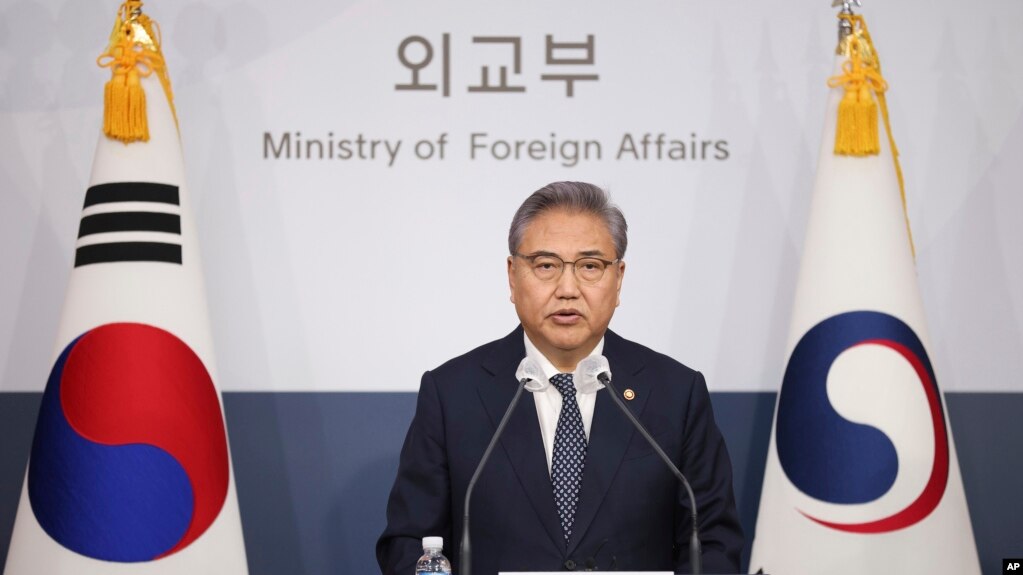South Korean Plan Aims to Ease Tensions with Japan, Pay Victims

South Korea announced a new plan Monday to pay Koreans who performed forced labor for Japan during World War II.
The plan does not require Japanese companies to provide any of the payments, also called reparations. South Korea’s Foreign Minister Park Jin told reporters that a local state-run foundation would use civilian donations to pay the victims.
The move is part of an effort by President Yoon Suk Yeol to improve ties with Japan. It is also an effort to solidify security cooperation with both Japan and the United States to better deal with nuclear threats from North Korea.
The plan uses money raised in South Korea. However, former forced laborers and their supporters criticized the move. So have opposition Democratic Party politicians. They have demanded direct payment from Japanese companies and a new apology from the Japanese government.
Japan colonized the Korean Peninsula from 1910 to 1945. The colonial rulers forced many thousands of Koreans to work for Japanese companies during World War II. Many of those forced to work have already died and survivors are now in their 90s.
A group of 15 victims brought a legal case in 2018 that affected relations between the neighboring countries. A South Korean court ordered Japan’s Nippon Steel and Mitsubishi Heavy Industries to pay the victims. But the ruling caused tensions between the countries.
Japan said that a 1965 treaty settled wartime compensation issues. It reacted by placing export controls on chemicals important to South Korea’s computer technology industry in 2019.
Then-President Moon Jae-in answered by threatening to end military intelligence-sharing agreements with Japan.
The dispute troubled American efforts to strengthen cooperation among South Korea, Japan and the U.S. in dealing with China and North Korea.
U.S. President Joe Biden welcomed news of the compensation plan, calling it a “new chapter” in cooperation and saying, “Our countries are stronger…when we stand together.”
A glass half full
Describing the plan, Park said, “If we compare it to a glass of water, I think that the glass is more than half full with water.” He added, “We expect that the glass will be further filled moving forward based on Japan’s sincere response.”
Later Monday, Yoon called the South Korean step a move “toward future-oriented Korea-Japan ties.” He said both governments must aim to enter a new period in their relations.
South Korean officials did not give details about which companies would finance the foundation. But, in January, Shim Kyu-sun, the chairperson of the Foundation for Victims of Forced Mobilization by Imperial Japan, said money would come from companies that gained from the 1965 treaty. The treaty normalized relations between South Korea and Japan and provided economic aid and loans to South Korea.
The main liberal opposition Democratic Party voiced opposition to Yoon’s new plan. When the party was in power, led by Moon, it took steps to cancel a foundation supported by Japan that was to pay women used as sex slaves during World War II.
Bong Young-shik is an expert at the Yonsei Institute for North Korean Studies. Bong said Yoon likely felt pressure to improve defense ties because of North Korea’s increasing missile threats.
Choi Eun-mi is a Japan expert at South Korea’s Asan Institute for Policy Studies. Choi said a plan paid for by third parties was the best answer for money to get to victims who are now in their 90s.
Choi noted that the negotiations have gone extended for nearly a year and the plaintiffs would have had the most to lose if the issue isn’t resolved now.
Words in This Story
compensation –n. something that is given to make up for damage or trouble
foundation –n. an organization supported by donations that is meant to do something good for society
sincere –adj. what is expressed in a true and honest way
response –n. a return communication; an answer
future-oriented –adj. aimed at the future, not the past
plaintiff –n. (legal) a person who brings a legal action
https://learningenglish.voanews.com/a/south-korean-plan-aims-to-ease-tensions-with-japan-pay-victims/6992257.html